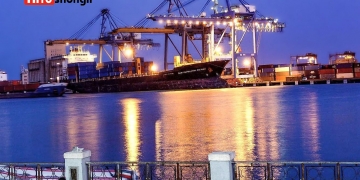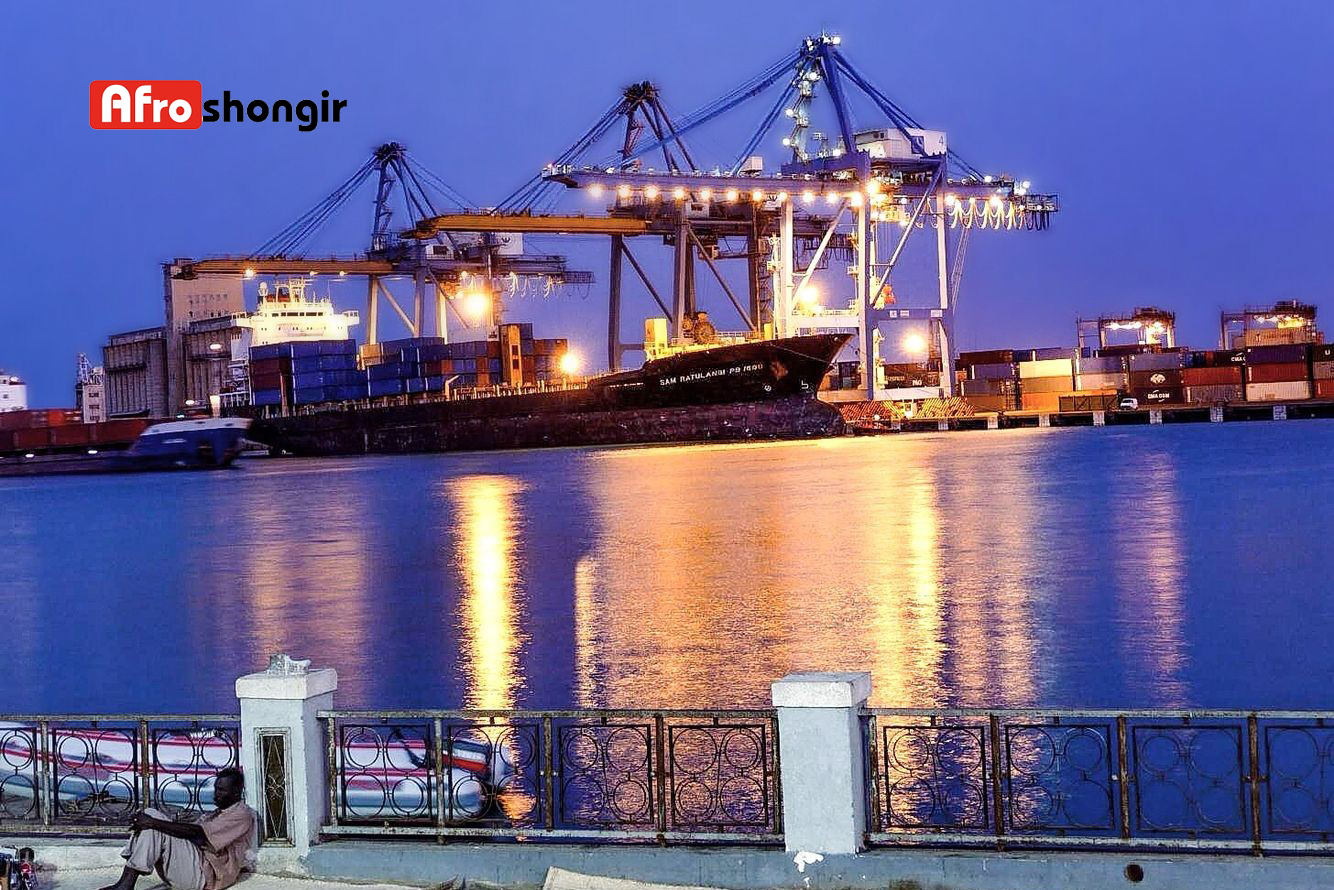
Khartoum: afroshongir
The escalation of the crisis of the ships’ agents with the committee investigating the violations of the Sudanese Ports Authority and Sudan Line, continued reaching the stage of the agents of the ships declared a strike if the committee did not back down from its decision obligating the agents to pay the fees in foreign currencies in a retroactive way.
The story started with the signing of an agreement several years ago, between the Maritime Ports Authority and the agents of shipping companies, according to which ships’ agents should pay 80% of the ships’ fees that anchor on Sudanese ports in hard currency (the euro), and 20% equivalent to the local currency. This was impelled , according Ports Authority, by the siege conditions the country underwent, in the previous era and still is, which forced the Ports’ Authority to open an account in Abu Dhabi Bank. So the authority asked the agents of the ships to pay the port fees in that account and as a result of the currency differences, the agents of the ships requested that the Ports Authority should bear part of the losses they had suffered following the law base “not to cause damage nor harm”.
On this basis an agreement was signed between the two parties, who were at the time the Deputy Director General of the Ports for Financial and Administrative Affairs, Salah Hajjam, and the director and representatives of the Chamber of Shipping Agencies headed by Captain Saif Al-Din Muhammad Abu Bakr. The agreement was ensured and renewed even after the December revolution. After the formation of the transitional government, the Undersecretary of the Ministry of Finance, Amna Abbakar Abdel Rasoul, agreed, through a letter addressed to the Director General of the Ports’ Authority, to pay the bills of ships to the Maritime Ports Authority, and with reference to the letter of the Chamber of Shipping Agencies dated February 25, 2020, in which the Undersecretary of the Ministry of Finance conveyed the approval of the Ministry of Finance Economic planning to pay the bills and the Authority’s entitlements to ships, as previously stated that 80% of the requirement in foreign currency within 30 days, 20% in local currency directly, provided that the ships concerned are anchored into the port until the new payment policy is reviewed.
The situation remained unchanged, until the Attorney General formed a committee to verify violations of selling Sudan Line assets, and violations of the Maritime Ports Authority headed, the committee, by the representative of the Supreme Red Sea Prosecutor, Mawlana Muhammad Abd al-Azim, who, through his committee’s search for the violations, considered that The Ports’ Authority took a wrong procedure violating the financial rules, which leads the ship agents to return all the value of 20% that was paid in the local currency to be paid in foreign currency and retroactively.
Accordingly letters were issued to all the managers of the navigation companies, in which they were asked to pay in hard currency in cash and in a special account that was opened in Bank of Sudan . However, approaches to take legal action against each of the violations. According to a number of the ships’ agents, in a direct contact, the Chairman of the Committee dealt coarsely with them without regard of any consideration.
Accordingly, the Shipping Agents Federation, through public letter, a copy obtained by (Afroshongir), addressed all concerned parties, headed by the Minister of Transport, Eng. Hashem Taher, the Governor of the Red Sea and the Director of Ports, through which it announced that federation will formally stop working if the investigation committee ,formed by the Attorney General for investigation in the violations of Sudan Line and Ports, did not stop requiring companies to pay the bills previously paid retroactively, as well as recovering all the cash and transferred amounts paid under threats directed to agents.
In the letter, they indicated that for more than fifty years they had not been subjected to such treatment, and that the prevailing method of payment was determined on bases of an agreement concluded between the Maritime Ports’ Authority as a legal person, and the Chamber of Shipping Agencies as a representative of the shipping companies that ruled that the claims of the Ports Authority should be paid by 80% in euros externally and 20% in local cash. The enforcement of the agreement over the past years was with the consent of the creditor (Ports Authority), but they were surprised that there was a committee formed by the Attorney General demanding the agents of ships to pay 20% of the local component retroactively and in foreign currency .
On the same trend, the Minister of Transport and Infrastructure, Eng. Hashem Taher, confessed that the mistake is of the Maritime Ports’ Authority, by accepting the requests of shipping companies and allowing them to pay 20% of the value of their bills in the national currency, equivalent to the official exchange rate set by the Central Bank of Sudan.
In the event that required his action, he resolved the matter by referring it to the Minister of Finance to report on it in accordance with the powers conferred on him. The Minister , on turn,acknowledged that the agents of the ships should not bear the mistakes of the entire body, and that the legal means to recover the relevant claims is to resort to the judiciary in the event of failure to pay.
The Minister of Transport mentioned another violation in which the investigation committee signed, relating to the collection of the amount and depositing it in a special account other than the account of the Ports Authority prepared for that, especially since the recovery of the amounts deposited in the local cash in the port accounts, and that the settlement procedures can only be done after the authority receives the amounts due in the Foreign currency.
Accordingly, the Federation of Ship Agents addressed all concerned parties, headed by the Minister of Transport, Eng. Hashem Taher, the governor of the Red Sea and the director of ports, that they will issue order to prevented entry of ships to all sea ports in the country. So the Chamber of Shipping Agencies issued a decision not to enter ships for all sea ports in the country, as of last Saturday and until further notice.
The Chamber circulated the decision ,obtained by (afroshongir), for the shipping agents, and they clarified that the decision comes within the measures taken regarding violations of the Maritime Ports’ Authority and the marine lines, and the decision obligated agents not to let ships enter all the country’s seaports as of Saturday, March 12th, with continuing work in ships anchored untill the completion of immediate loading, unloading and departure works, and the continuation of work on the issuance of delivery permissions to the owners of the goods.
However, the governor of the Red Sea State in charge, Major General Hafez Al-Taj Al-Makki, anticipated entering a strike by holding an emergency meeting at noon last Thursday in the Ministers Hall under the supervision of the Minister of Infrastructure and Transport, Eng. Hashem Taher, Director General of the Ports Authority and the Red Sea Security Committee and Director of the Sea Ports Authority, Captain Onour, Port Sudan Shipping Agency.
The meeting discussed the decision of the Chamber of Navigational Agencies regarding the Chamber to suspend operations in seaports.
The Minister of Transport, Eng. Hashem Taher, praised the national role of shipping agencies, especially the cancellation of the decision to suspend port operations, at the critical time the country is going through, which is represented in health conditions.
The president of the Chamber of Shipping Agencies, Ahmed Bashir, announced the cancellation and halt of the strike announced at the port for the sake of the homeland. For his part, member of the Chamber of Navigational Agencies, Mu’tasim Ezzeddine, praised the spirit that prevailed in the meeting, and accordingly, the membership of navigational agencies in Sudan will continue to work for the supreme interest of the country.
In this context, the chief engineer of the harbor station (the head of the reformist force), Sami Al-Sayigh, who explained that the reform forces were formed in 2015 against privatization and corruption and continued to work despite the arrests and job marginalization of its personnel until the success revolution the formation of a union, the government of the rushed to pass the law.
Al-Sayiegh emphasized their pursuit of developing ports and appealed to the Minister of Finance to waive a few of the ports ’income in hard currency to purchase and expedite the financial ratifications of the procurement, calling for expediting the implementation of the requirements of the dismantling committees due to the repercussions of the country’s deep government in the workflow.
Customs broker, Salah Sharaf Al-Din, said that the decision to stop work by navigation companies was canceled in appreciation of the critical circumstances that the country and the world as a whole went through, noting that the investigation committee in charge of reviewing the Maritime Ports Authority had arrested a number of employees of the authority due to corruption cases in the authority. Including shipping companies, stressing the responsibility of the Ports Authority towards shipping companies, as it is the one that grants licenses to work in Sudan and all fees are collected from ships in hard currency and it has been in effect since the establishment of the authority in 1974 to 2018 until the liquidity crisis appeared, and it was necessary to provide cash liquidity Confronting the benefits of the workers of the Association for Shipping and Clearing ” Association of the Ports “, as well as the benefits of employees, workers, salaries, incentives, etc., and the state failed to provide cash liquidity to meet the needs of the authority except partially, which led to severe grumbling by the shipping and discharging groups, which led to the threat to stop work .
Here the association called on the authority to exert great efforts to obtain the necessary liquidity to cover operating expenses so as not to stop the work of ports, pointing to the efforts represented in collecting port fees for imports and exports in cash, considering this a partial success. Because the liquidity crisis affected everyone ‘In addition, in this regard, the authority contacted the union of the clearance agents through personal relations and they were excused because the loyal people suffer from the same problem, and the ports resorted to the shipping companies to provide liquidity and the shipping companies responded to the request of the Ports Authority, to be paid 20% Of the Authority’s entitlements to shipping companies in local currency in cash.
He said that accounting for shipping companies at the rate of 20% at the official price of the dollar from the Bank of Sudan in which there is a great difference between the official price and the parallel market goes to the shipping companies, which is a very huge amount, wondering how the shipping companies, most of which are foreign, were able to provide the local currency at a time when a sovereign body such as the ports failed. Stressing that the matter led to the emergence of the process of trading in the local currency, that is, the phenomenon of usury by buying cash by check paying a greater sum than the actual sum , indicating to the benefits that shipping companies achieve from buying money on interest, noting at the same time that their benefit lies in the price difference between the official dollar and the price in the Parallel market, which is at least 70% on average and buy the local currency, up 20% maximum, which led to the spread of the phenomenon of usury.















